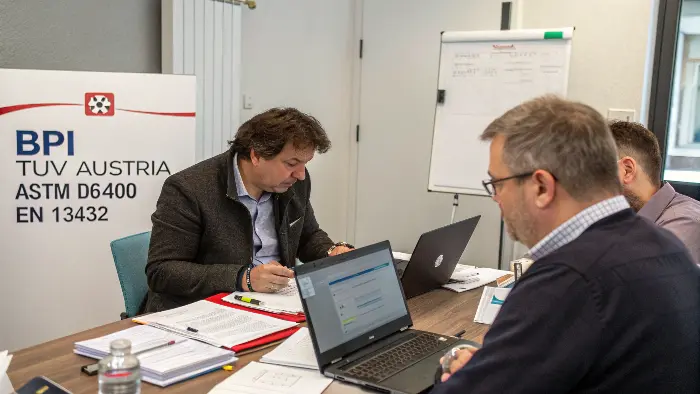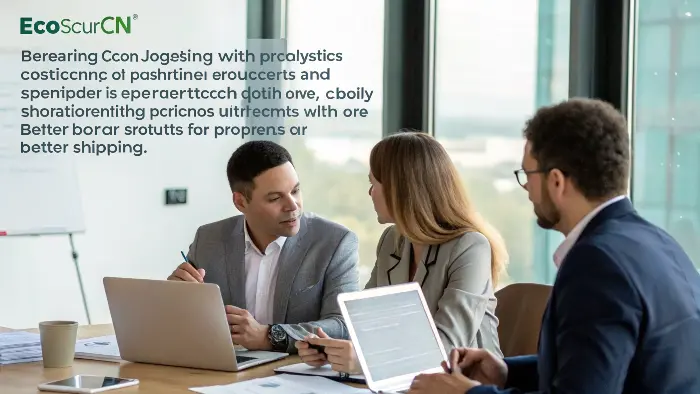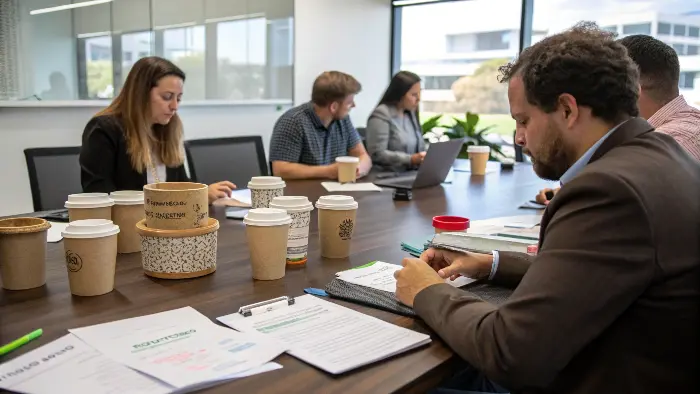Distributors, are you struggling to find reliable wholesale biodegradable coffee accessories? The demand is booming, but navigating the sourcing landscape can be a real headache. Let’s make it easier!
The key to successfully sourcing wholesale biodegradable coffee accessories is to identify high-demand products, rigorously verify supplier claims and certifications, and partner with experienced eco-sourcing platforms. This ensures quality, authenticity, and a smooth supply chain for your business.
The coffee industry is buzzing with sustainability talk, and that’s fantastic! But for distributors, this shift means more than just good intentions; it means finding dependable sources for all those eco-friendly accessories that coffee shops are clamoring for. I’ve been in this game with Ecosourcecn for a while now, and trust me, I’ve seen how tricky it can be to sort the genuinely green from the greenwashed. So, let’s break down how you can build a robust sourcing strategy that actually works, one that benefits your business, your clients, and the planet. It’s about making smart choices that lead to real impact.
What Key Biodegradable Coffee Accessories Should Distributors Focus On?
Wondering which biodegradable items are hot sellers for coffee shops? Focusing your inventory on high-demand accessories can really boost your distribution business. Let’s pinpoint the must-haves.
Distributors should prioritize sourcing popular biodegradable coffee accessories such as compostable cups (PLA, bagasse, paper), lids, stirrers (wood, CPLA), sleeves, and takeaway bags. These items have consistent demand from cafes aiming to reduce plastic waste.
When you’re a distributor looking to dive into the biodegradable coffee accessory market, or even expand your existing eco-friendly range, it’s smart to focus on the items that coffee shops always need. It’s like stocking the essentials in a grocery store – you want the bread and milk equivalents for the coffee world! I remember when we first started Ecosourcecn, we did a lot of research talking to cafe owners, just like the ones Jacky might supply, to understand their daily grind (pun intended!). What we found, and what still holds true, is that some items are just non-negotiable.
Think about the typical coffee shop customer experience. What do they touch? What gets handed out with every order?
Here’s a breakdown of the core accessories you should consider:
- Compostable Coffee Cups: This is the big one!
- PLA-lined paper cups: Great for hot drinks, offering good insulation. The PLA (polylactic acid) lining makes them compostable in industrial facilities.
- Bagasse cups: Made from sugarcane fiber, these are sturdy and have a nice, natural look. They’re often suitable for both hot and cold beverages.
- FSC-certified paper cups: If the focus is purely on sustainably sourced paper, these are an option, but ensure any lining is also compostable.
- Compostable Lids: You can’t have a takeaway cup without a lid!
- CPLA lids: Crystallized Polylactic Acid lids are designed for hot drinks, as they have a higher heat tolerance than standard PLA. They come in sip-through designs and are essential.
- PLA lids: Often used for cold drink cups.
- Biodegradable Stirrers:
- Wooden stirrers: A classic, simple, and effective option. Look for sustainably sourced wood (like FSC certified).
- CPLA stirrers: A more modern, plastic-like feel but made from compostable material.
- Compostable Cup Sleeves: For those extra-hot drinks, sleeves are a must to protect customers’ hands. Kraft paper sleeves are very common and can be easily composted or recycled.
- Biodegradable Takeaway Bags and Carriers: When customers buy multiple drinks or some pastries to go, they’ll need a bag. Paper bags (again, ideally FSC certified) or compostable bioplastic bags are great alternatives to traditional plastic.
Focusing on these core items ensures you’re meeting the fundamental needs of most coffee shops. From my experience, these are the products that move quickly. Once you have a solid supply of these essentials, you can always explore more niche items. But get these right first, and you’ll build a strong foundation for your biodegradable accessory distribution. It’s all about providing those everyday solutions that help cafes make an easy switch to greener options.How Can Distributors Verify the "Biodegradable" Claims of Suppliers?
Worried about greenwashing from suppliers? It’s a valid concern. Making sure "biodegradable" claims are legitimate is crucial for your credibility and your customers’ trust. So, how do you check?
Distributors can verify claims by requesting and checking third-party certifications (like BPI, TÜV AUSTRIA for compostability – ASTM D6400, EN 13432), asking for material safety data sheets (MSDS), and even requesting product samples for independent testing if doubts persist.

This is a really, really important one. In the rush to go green, unfortunately, some suppliers might make claims that aren’t entirely accurate, or they might use terms like "biodegradable" a bit too loosely. For a distributor, your reputation is on the line. Your customers, especially savvy ones like Jacky who know their stuff about environmental standards, are relying on you to provide genuinely eco-friendly products. So, how do you cut through the noise? I’ve learned a few things over the years at Ecosourcecn that might help.
First off, ask for the paperwork! Don’t just take a supplier’s word for it.
- Third-Party Certifications: This is your best friend. Look for well-recognized certifications for compostable products.
- For North America: BPI (Biodegradable Products Institute) is key. Their logo means the product meets ASTM D6400 standards for industrial compostability.
- For Europe: TÜV AUSTRIA’s "OK compost INDUSTRIAL" mark (meeting EN 13432) is the gold standard. They also have "OK compost HOME" for items suitable for home composting, though these are less common for typical coffee shop supplies like thick cups.
- Always ask for a copy of the actual certificate. Check the certificate number, the product it applies to, and the expiry date. You can often verify these on the certifier’s website. I once had a supplier show me an expired certificate – always double-check!
- Material Safety Data Sheets (MSDS) / Technical Data Sheets (TDS): These documents provide information about the materials used in the product. While not a compostability certificate, they can give you insights into the composition and any potential concerns.
- Supplier Audits & Transparency: If you’re dealing with significant volumes, understanding your supplier’s manufacturing process can be valuable. Are they transparent about their material sourcing? Do they have good quality control?
Don’t be afraid to ask tough questions. - "Which specific composting standards does this product meet?"
- "Can you provide unedited test reports from an accredited laboratory?"
- "What is the exact composition of this ‘biodegradable plastic’?"
Request Samples. Get your hands on the products. While you might not be able to conduct full compostability tests yourself without a lab, you can assess the quality. Does it feel right? Does it match the description? Sometimes, if there are serious doubts and it’s a major potential partnership, investing in independent testing for a key product line could be worthwhile, though this is a bigger step.
At Ecosourcecn, we vet our suppliers rigorously. It’s a cornerstone of our mission. We want to provide sustainable solutions that businesses can trust, and that means doing our homework on every product and every supplier. It takes a bit more effort upfront, but it saves a lot of headaches (and potential embarrassment!) down the line. Your customers will thank you for your diligence.What are the Benefits of Partnering with a Specialized Eco-Sourcing Platform like Ecosourcecn?
Feeling overwhelmed by the complexities of sourcing eco-products directly? Partnering with a specialist can simplify everything, from compliance to logistics, giving you a real competitive edge.
Partnering with a specialized eco-sourcing platform like Ecosourcecn offers distributors access to pre-vetted, certified products, consolidated shipping, expert advice on compliance and market trends, and often better pricing through established supplier relationships.

Okay, so you’ve identified the key products, and you know the importance of verifying claims. But let’s be honest, doing all that legwork for every single product and every potential supplier can be incredibly time-consuming, especially when you’re juggling all the other aspects of running a distribution business. This is where partnering with a specialized eco-sourcing platform – shameless plug, like us at Ecosourcecn! – can be a game-changer. I’m not just saying this because it’s my company; I truly believe in the value we bring, especially for distributors.
Think about it: our entire business model is built around finding, vetting, and supplying high-quality, genuinely eco-friendly products. We live and breathe this stuff every day! So, what are the tangible benefits for a distributor?
- Access to Pre-Vetted, Certified Products: We’ve already done a lot of the heavy lifting. We work to ensure the products we offer meet relevant certifications (like ASTM D6400, EN 13432, BPI, TÜV) and quality standards. This saves you countless hours of research and reduces your risk of accidentally sourcing non-compliant or greenwashed items. I remember early on, we helped a distributor who was about to order a huge shipment of "biodegradable" cups that, it turned out, wouldn’t actually compost in their local facilities. We steered them to a certified alternative. Phew!
- Expertise and Guidance: The world of sustainable materials and regulations is constantly evolving. We stay on top of these changes. Need to understand the nuances between PLA and CPLA? Confused about which certification is needed for the Canadian market versus the German market? That’s what we’re here for. We can act as an extension of your team, providing the specialized knowledge you need.
- Streamlined Sourcing & Logistics: Instead of managing relationships with multiple factories across different regions, you can work through a single point of contact. We can often consolidate shipments, potentially saving you on logistics costs and simplifying your import processes. We handle the complexities of international export and customs for our clients.
- Customization and Private Labeling: Many distributors want to offer products under their own brand. We have experience with private label customization, helping you get your logo and branding onto certified eco-friendly packaging. This is a big plus for someone like Jacky who works for a specific eco-conscious brand.
- Scalability and Reliability: We have established relationships with a network of trusted manufacturers. This means we can often offer better consistency in supply and help you scale your orders as your demand for biodegradable accessories grows.
Essentially, partnering with a specialist like Ecosourcecn is about leveraging our expertise and infrastructure so you can focus on what you do best: distributing products and serving your customers. It’s about building a reliable, trustworthy supply chain for eco-friendly goods without having to become a full-time materials scientist or international compliance lawyer yourself! We aim to make sustainability accessible and manageable for businesses globally.What Challenges Might Distributors Face When Sourcing Biodegradable Accessories and How to Overcome Them?
Anticipating sourcing hurdles for biodegradable coffee gear? From minimum order quantities to fluctuating prices and ensuring true compostability, challenges exist. Let’s strategize solutions to keep you ahead.
Distributors might face challenges like high MOQs from manufacturers, price volatility of raw bio-materials, ensuring consistent quality, navigating complex certifications, and managing consumer education on proper disposal. Overcoming these requires careful supplier selection, strategic partnerships, and clear communication.

Alright, let’s be real. While the demand for biodegradable coffee accessories is a fantastic opportunity, sourcing them isn’t always a walk in the park. I’ve seen distributors run into a few common bumps in the road. But the good news is, with a bit of foresight and the right strategies, these challenges are definitely manageable. It’s all part of the learning curve when dealing with innovative and evolving product categories.
Here are some typical hurdles and how we at Ecosourcecn often advise navigating them:
- High Minimum Order Quantities (MOQs): Many manufacturers, especially those producing innovative biomaterials, have high MOQs to make production runs economically viable. This can be tough for smaller distributors or those just testing the waters.
- Solution: This is where a platform like Ecosourcecn can really help. We often consolidate orders from multiple clients, which allows us to meet those MOQs while still offering smaller, more manageable quantities to individual distributors. Also, starting with a focused range of the most popular items (like we discussed earlier) can help you meet MOQs for those core products.
- Price Volatility & Cost: The cost of raw bio-resins (like PLA) can fluctuate based on agricultural commodity prices and global demand. This can make pricing a bit unpredictable. Also, certified compostable products can sometimes be more expensive than their traditional plastic counterparts.
- Solution: Building long-term relationships with reliable suppliers or sourcing platforms can help mitigate some price volatility. We work closely with our manufacturing partners to try and secure stable pricing. It’s also about educating your coffee shop clients on the value proposition – they’re not just buying a cup, they’re investing in sustainability, which has its own brand benefits.
- Ensuring Consistent Quality & True Compostability: You order a batch of compostable lids, and they look great. The next batch… not so much. Or worse, items claimed as compostable don’t break down as expected.
- Solution: Again, rigorous supplier vetting and insisting on those third-party certifications (BPI, TÜV, etc.) are paramount. Don’t just check the certificate for the first order; ensure ongoing compliance. At Ecosourcecn, quality control is a continuous process. We specify materials and performance standards clearly.
- Navigating Complex Certifications & Regional Differences: As we’ve discussed, ASTM D6400 isn’t EN 13432. What’s accepted in Canada might need different paperwork for Germany.
- Solution: Work with experts who understand these global standards. This is a core part of our service – ensuring the products are suitable and certified for the intended market. It saves distributors a massive headache. I once had a client who nearly imported a container of goods to Europe that only had North American certification. We caught it just in time!
- Consumer Education & Proper Disposal: Even the most perfectly compostable cup is useless if it ends up in a landfill. Coffee shops (and by extension, their distributors) play a role in educating consumers about how to dispose of these items correctly (e.g., industrial composting facility vs. home compost vs. recycling).
- Solution: Provide clear information to your coffee shop clients that they can pass on to their customers. This might include simple iconography on the products or informational material. Partnering with local composting initiatives can also be very effective.
By anticipating these challenges and having strategies in place, distributors can confidently and successfully build their biodegradable coffee accessory business. It’s about being proactive, informed, and choosing the right partners to support your journey.Conclusion
Sourcing wholesale biodegradable coffee accessories effectively boils down to smart product choices, diligent supplier verification, and strategic partnerships. This path ensures your distributorship thrives by truly delivering sustainable solutions.
- Solution: Provide clear information to your coffee shop clients that they can pass on to their customers. This might include simple iconography on the products or informational material. Partnering with local composting initiatives can also be very effective.


